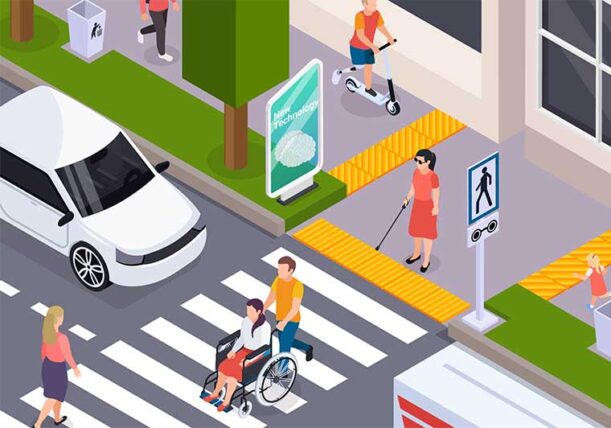The Centers for Disease Control and Prevention (CDC) statistics show that 61 million adults in the United States live with a disability. The CDC defines a disability as “any condition of the body or mind (impairment) that makes it more difficult for the person with the condition to do certain activities (activity limitation) and interact with the world around them (participation restrictions).” Thus, 1 in 4 adults in the US have some type of disability, and in adults over 65, the number rises to 2 in 5. Having facilities that are not compliant with the Americans with Disabilities Act (ADA) impacts the lives of millions of people each day. These non-ADA compliant facilities are barriers for mobility and safe access for these vulnerable groups, and they also decrease safety for all users.

There are various user needs that must be accommodated.
Why should I care?
A quick Google search on ADA curb ramp compliance lawsuits will show you that more than 142 local governments have been named in lawsuits for failing to install and/or maintain sidewalks and curb ramps in compliance with the requirements of the ADA. The outcome of these lawsuits resulted in settlements where the local governments agreed to allocate funding to bring their sidewalks and curb ramps into compliance. The settlements ranged from a few million dollars to over $1.3 billion dollars.
Cities and states across the country are starting to allocate funds to investigate and address their facilities that are not ADA compliant. For example, the Wisconsin Department of Transportation (WisDOT) has recently solicited for consultant design services to investigate and develop plans to address hundreds of curb ramps in each region. WisDOT anticipates that each region will have one or two standalone projects each year that will address between 150 to 400 curb ramps each.
How can public entities protect themselves from these lawsuits?
Public entities can protect themselves from lawsuits by having a formal transition plan in place as spelled out in the Code of Federal Regulations 28 cfr 35.150 (d). The transition plan needs to contain at a minimum the following items:
- An inventory of all facilities that limit the accessibility of its programs or activities to individuals with disabilities.
- A description of the detailed methods that will be used to make the facilities accessible.
- The schedule for implementation, and if longer than one year, the steps that will be taken each year during the transition plan.
- The official responsible for implementation of the plan.
Will the Bipartisan Infrastructure Law (BIL) provide funding for improving non-ADA compliant facilities?
According to the White House’s August 3, 2021, press release, the BIL includes:
- $5 billion for the “Safe Streets for All” program to fund state and local plans and improvements to reduce crashes and fatalities for the most vulnerable of roadway users (pedestrians and bicyclists).
- $2 billion for the Transit Station ADA program, which is broken down into:
- $1.75 billion for All Stations Accessibility.
- $250 million for Enhanced Mobility for Seniors and Individuals with Disabilities.
- These two programs will remove barriers to transportation services and expand mobility options for individuals.
To determine your eligibility for this BIL funding, you will need to coordinate with either your local metropolitan planning organization (MPO) and/or your state Department of Transportation (DOT), depending on your local situation.
Key Takeaways
While millions of Americans currently live with a disability, there are still plenty of facilities that are not compliant with the standards of the ADA. This results in unnecessary barriers for this vulnerable group—along with potential costly lawsuits for owners of these facilities. However, public entities can protect themselves from these lawsuits with a formal transition plan as outlined in the in the Code of Federal Regulations 28 cfr 35.150 (d). There is also potential funding available in the BIL allocated to help improve non-ADA complaint facilities.



